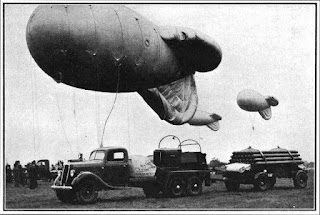Eighty years ago, modern air raid precautions and village fete combine on Clapham Common
In something of a
festival atmosphere there was a demonstration of various air raid precaution
measures on Clapham Common. Regular tennis, putting and kite-flying sessions were
not disturbed and blended in a strange variant of the village fete. Using the
tethered barrage balloons, whose combat function was to force attacking
aircraft higher, to carry the loudspeakers on which public announcements and
speeches were made only added to this strange blend. The mayors of the surrounding boroughs were out in force.
The flypast of the Bristol Blenheim fighters of 601 (County of London)
(Fighter) Squadron was rather more military
but even here there was a flavour of a visit by the local gentry. The
squadron was famously manned by the well-heeled, giving it the nickname “The
millionaires’ mob.” The Blenheim was also useless as a fighter aircraft and fortunately
601’s were superseded by Hawker Hurricanes in time for the Battle of Britain.
Josef Goebbels, the Nazi propaganda
minister visited Danzig for the congress of the local Nazi party. Before a
crowd of 10,000 he gave an emphatic commitment that the goal that the Führer
had stated a couple of months before, that Danzig would return to the Reich,
would be achieved. Germany was led by Hitler and not some worthless bourgeois politician.
The speechifying emanating from Warsaw and London were irrelevant to the
process. In practice all that Britain had any hope of influencing was the
manner in which the transfer was effected.
Close observers of the
diplomatic scene might have noted that Count Schulenberg, the German ambassador
to Moscow had returned to his post, after being recalled to Berlin for
consultations. Moreover, he was to report back on the prospects of a renewal of
the trade deal between Germany and the Soviet Union. If his findings were
positive, a German trade delegation would be despatched to negotiate. Coupled
with the swift refusal of the most recent set of Anglo-French proposals delivered
by Stalin’s recently installed hard-line foreign minister, Molotov, this might
have given a hint of the diplomatic revolution that was to arrive two months
later.



Comments
Post a Comment